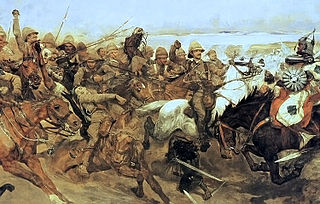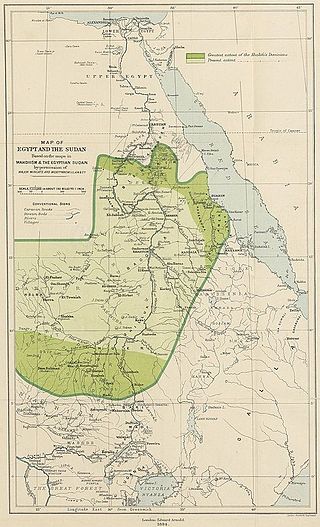
The Battle of Omdurman was fought during the Anglo-Egyptian conquest of Sudan between a British–Egyptian expeditionary force commanded by British Commander-in-Chief (sirdar) major general Horatio Herbert Kitchener and a Sudanese army of the Mahdist State, led by Abdallahi ibn Muhammad, the successor to the self-proclaimed Mahdi, Muhammad Ahmad. The battle took place on 2 September 1898, at Kerreri, 11 kilometres (6.8 mi) north of Omdurman.

Muhammad Ahmad bin Abdullah bin Fahal was a Sudanese religious and political leader. In 1881, he claimed to be the Mahdi, and led a war against Egyptian rule in Sudan which culminated in a remarkable victory over them in the Siege of Khartoum. He created a vast Islamic state extending from the Red Sea to Central Africa, and founded a movement that remained influential in Sudan a century later.

Abdullah ibn-Mohammed al-Khalifa or Abdullah al-Khalifa or Abdallahi al-Khalifa, also known as "The Khalifa" was a Sudanese Ansar ruler who was one of the principal followers of Muhammad Ahmad. Ahmad claimed to be the Mahdi, building up a large following. After Ahmad's death, Abdullah ibn-Mohammed took over the movement, adopting the title of Khalifah al-Mahdi. He attempted to create a kingdom, which led to widespread discontent, and his eventual defeat and death at the hands of the British and Egyptians.

The Battle of Abu Klea, or the Battle of Abu Tulayh took place between 16 and 18 January 1885, at Abu Klea, Sudan, between the British Desert Column and Mahdist forces encamped near Abu Klea. The Desert Column, a force of approximately 1,400 soldiers, started from Korti, Sudan on 30 December 1884; the Desert Column's mission, in a joint effort titled "The Gordon Relief Expedition", was to march across the Bayuda Desert to the aid of General Charles George Gordon at Khartoum, Sudan, who was besieged there by Mahdist forces.

Colonel William Hicks, also known as Hicks Pasha,, was a British soldier who entered the Bombay Army in 1849, and served through the Indian mutiny, being mentioned in dispatches for good conduct at the action of Sitka Ghaut in 1859.

The Battle of Shaykan was fought between Egyptian forces under the command of Hicks Pasha and the forces of Muhammad Ahmad, the self-proclaimed Mahdi, in the woods of Shaykan near Kashgil near the town of El-Obeid during 3–5 November 1883.

The Mahdist State, also known as Mahdist Sudan or the Sudanese Mahdiyya, was a state based on a religious and political movement launched in 1881 by Muhammad Ahmad bin Abdullah against the Khedivate of Egypt, which had ruled Sudan since 1821. After four years of struggle, the Mahdist rebels overthrew the Ottoman-Egyptian administration and established their own "Islamic and national" government with its capital in Omdurman. Thus, from 1885 the Mahdist government maintained sovereignty and control over the Sudanese territories until its existence was terminated by the Anglo-Egyptian forces in 1898.

The siege of Khartoum took place from 13 March 1884 to 26 January 1885. Sudanese Mahdist forces captured the city of Khartoum from its Egyptian garrison, thereby gaining control over the whole of Sudan.

Osman Digna was a follower of Muhammad Ahmad, the self-proclaimed Mahdi, in Sudan, who became his best known military commander during the Mahdist War. He was claimed to be a descendant from the Abbasid family. As the Mahdi's ablest general, he played an important role in the fate of General Charles George Gordon and the end of Turkish-Egyptian rule in Sudan.

The Mahdist War was a war between the Mahdist Sudanese, led by Muhammad Ahmad bin Abdullah, who had proclaimed himself the "Mahdi" of Islam, and the forces of the Khedivate of Egypt, initially, and later the forces of Britain. Eighteen years of war resulted in the creation of Anglo-Egyptian Sudan (1899–1956), a de jure condominium of the British Empire, and the Kingdom of Egypt, in which Britain had de facto control over Sudan. The Sudanese launched several unsuccessful invasions of their neighbours, expanding the scale of the conflict to include not only Britain and Egypt but also the Italian Empire, the Congo Free State and the Ethiopian Empire.

The Nile Expedition, sometimes called the Gordon Relief Expedition (1884–1885), was a British mission to relieve Major-General Charles George Gordon at Khartoum, Sudan. Gordon had been sent to Sudan to help the Egyptians withdraw their garrisons after the British decided to abandon Sudan in the face of a rebellion led by self-proclaimed Mahdi, Mahommed Ahmed. A contingent of Canadians was recruited to help the British navigate their small boats up the Nile River. The Nile Expedition was the first overseas expedition by Canadians in a British imperial conflict, although the Nile Voyageurs were civilian employees and did not wear uniforms.

The Battle of Ginnis was a minor battle of the Mahdist War that was fought on December 30, 1885, between soldiers of the Anglo-Egyptian Army and warriors of the Mahdist State. The battle was caused by the Mahdist blockade of the Ginnis-Kosha Fort, which British commanders hoped to relieve.

Assegai is Wilbur Smith's thirty-second novel, it follows The Triumph of the Sun in which the author brought the Courtney and Ballantyne series together. Assegai tells the story of Leon Courtney and is set in 1906 in Kenya. The events in the story are linked to and precede the outbreak of World War One.
The River Column was a unit of British soldiers during the Mahdist War.
The Courtney Novels are a series of twenty four novels published between 1964 and 2024 by Wilbur Smith. They chronicle the lives of the Courtney family, from the 1660s through until 1987.

The Khalifa House Museum is an ethnographic museum, located opposite the tomb of Muhammad Ahmad in the city of Omdurman in Sudan. Towards the end of the 19th century, it was the residence of the successor of the Mahdi, Khalifa Abdallahi ibn Muhammad and the headquarters of the administration of the Mahdi State. The House was converted into a museum in 1928 during the Anglo-Egyptian condominium.

The Battle of Abu Hamed occurred on 7 August 1897 between a flying column of Anglo-Egyptian soldiers under Major-General Sir Archibald Hunter and a garrison of Mahdist rebels led by Mohammed Zain. The battle was a victory for the Anglo-Egyptian forces, and secured for the British the strategically vital town of Abu Hamed, which was the terminus for trade and transportation across the Nubian Desert.

The Anglo-Egyptian conquest of Sudan in 1896–1899 was a reconquest of territory lost by the Khedives of Egypt in 1884–1885 during the Mahdist War. The British had failed to organise an orderly withdrawal of the Egyptian Army from Sudan, and the defeat at Khartoum left only Suakin and Equatoria under Egyptian control after 1885. The conquest of 1896–1899 defeated and destroyed the Mahdist State and re-established Anglo-Egyptian rule, which remained until Sudan became independent in 1956.

Frank Thomas Miller Lupton, or Lupton Bey, was a British sailor who served as an administrator in the Egyptian Sudan. He was governor of Bahr el Ghazal province in 1881 at the start of the Mahdist War. Cut off from supplies and reinforcements, he had to surrender the province in 1884. After an initial period of freedom he was enchained for ten months. He was freed but struggled to make a living, his health deteriorated and he died in poverty. He had married a local woman who survived him, as did their two daughters.

The Mahdi's tomb or qubba is located in Omdurman, Sudan. It was the burial place of Muhammad Ahmad, the leader of an Islamic revolt against Turco-Egyptian Sudan in the late 19th century.


















